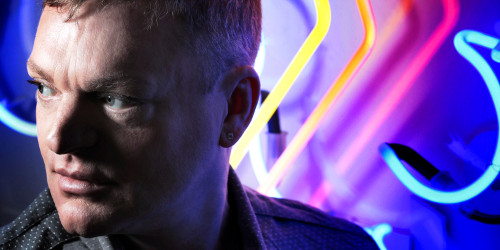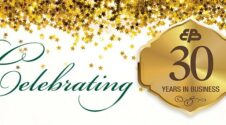By Christopher J. Treacy

I'll never forget the first time I saw Erasure perform. It was at The Ritz in NYC, 1987. I was 17 years old, and singer Andy Bell took the stage in what could only be described as a red rubber diaper. Any doubts I'd had about what he was up to suddenly vanished: Andy Bell was an unapologetic, flaming homosexual.
Up until that point, I wasn't quite sure. It was the '80s, after all. Though flamboyance characterized the look of bands like Depeche Mode and Duran Duran, it was all ambiguous nonsense … straight boys playing fey, sporting angular haircuts and marketing themselves as "possible" to anyone willing to stare. But Bell's voice always rang with a degree of authenticity that the others lacked. He was tripping off my gaydar, though I'd never heard that term and wasn't sure if I believed any such internal barometer actually existed. There was something surreal about Andy Bell, and part of me couldn't believe that my hunch might actually be accurate, that I wasn't wishfully imagining things. Was he for real?
Andy Bell helped me. He was a pioneer. He took one for the team. Nearly 30 years later, it's no longer that big of a deal when a pop star admits to being something other than heterosexual. But Bell, now 50, helped make that happen, so it makes perfect sense for him to be headlining Motor City Pride this year. Erasure has been a sturdy vehicle for Bell's instantly recognizable pipes, and musical partner-in-crime, Vince Clarke (Yaz, Depeche Mode), has been a most willing and tolerant fag hag.
Twenty-five million records sold worldwide and over 30 Top-40 hits in the UK is nothing to scoff at, but the first Erasure album, 1986's "Wonderland," wasn't initially successful. Curiously, it wasn't until a year later that things began to pick up for the duo, which coincided with Bell's decision to turn up the volume on his image.
"I did worry a bit and was quite nervous at first," he says during our recent exchange. "Vince kind of guessed, but he thought it was cool, and the label didn't say anything. We were very lucky." But by the 1987 U.S. tour, he says, "I made a conscious effort to make it totally obvious and unapologetic."
When Bell says Erasure was lucky, he's not kidding. They hit the jackpot, being signed to Sire in the States (Mute in the U.K.) – an eclectic label that had been acquired by Warner Bros. in the late '70s. Sire seemed to thrive on envelope-pushing artists, eventually signing Madonna. So if any label with major distribution would be comfortable with an openly gay front man, Sire was the one. That the group eventually became a financial boon has helped them hang onto a record deal longer than most of their synth-pop peers. But that's a double-edged sword: Erasure achieved success at a time when selling records was a viable source of income and touring costs were usually subsidized by the label, which has made transitioning to the new digital regime tough on both artist and audience.
"I don't think it will recover," Bell says of the current state of the music industry. "Artists have literally become 'artists' in their own right – we don't even own our own masters. So, all we can do is play live and make new recordings to try and keep people interested. You need to be very dedicated! Because of the onslaught of reality television and the lack of true quality music shows, it's very difficult to reach a new audience. Our original fans like to have hard copies, so it's challenging for us to cross into digital sales.
"We've never really been included in the mainstream rock press, either, which means I have to do thousands of local radio and gay press interviews with every project. It makes me wonder if people only buy what they've seen on television, which is very sad. Everything has become totally homogenized – it's fast food music. We have all become fast food products."
Over the years, Bell has had the distinction of being named an Ambassador for the Hetrick Martin Institute (i.e. Harvey Milk High School) in New York and has been given the keys to the city of San Francisco. Naturally, he's honored to headline at Pride. But he's also of two minds about the season and feels the community needs more outreach regarding addiction.
"It's a shame when the Pride celebrations start to become too big and commercialized, but it goes hand in hand with our own success," he says, noting that Pride in his native U.K. is exactly the same, but with an even heavier accent on drinking. "We have to pay for policing and cleaning up, etc. So the money has to come from somewhere. It is great to see the growth, but you can't help but feel nostalgic for the innocent, naive days. One thing I don't think we've really ever addressed properly is drug use within the community. It kind of goes hand in hand with low self-esteem, and there's a sense of hedonism when you first come out that's so inviting. I think we push it to the back of our minds because we all just want to be beautiful and fabulous. The only places I've seen posters for help with Crystal Meth is either at the sexual health clinic or the entrance to a club. Young people find it very hard to listen to the likes of us elders, but maybe we should try reaching out a bit more."
With 15 full-length Erasure studio releases (their 16th, "The Violet Flame," is due Sept. 23), as well as several live sets and numerous EP's, the duo has run the gamut, from ABBA covers to Christmas music. But Bell isn't done yet. He's also put out two solo collections, "Electric Blue" (2005) and "Non-Stop" (2010), and would love to expand beyond synth-pop should he find the time.
"I still think the idea of an Erasure musical is a good one, but it wouldn't be a hits-fest," he says, as if the idea had been previously shot down. "It'd have to be some left-field story using some of our more beautiful songs as dialogue. Otherwise, I love the thought of a horror film with only Erasure as the soundtrack.
"Frankly, though, I get a bit fed up with releases being so scrunched up together," he continues. "If I could, I'd really like to take time out on something much more personal and less commercial – a few strings, torch songs and ballads, perhaps. I would like people to hear that my voice is very versatile, sweet and healing. I'd quite like to show so-called 'crooners' how it should be done … properly."
Andy Bell
8 p.m. June 7
Pride Stage, Hart Plaza
1 Hart Plaza, Detroit
http://motorcitypride.org











